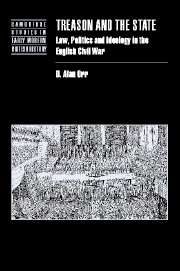Book contents
- Frontmatter
- Contents
- Acknowledgments
- List of abbreviations
- Introduction
- Part I Concepts
- Part II Practice
- 3 Thomas Wentworth, First Earl of Strafford
- 4 William Laud, Archbishop of Canterbury
- 5 Connor Lord Maguire, Second Baron of Enniskillen
- 6 Charles Stuart, King of England
- Conclusion
- Bibliography
- Index
- Cambridge Studies in Early Modern British History
3 - Thomas Wentworth, First Earl of Strafford
Published online by Cambridge University Press: 21 July 2009
- Frontmatter
- Contents
- Acknowledgments
- List of abbreviations
- Introduction
- Part I Concepts
- Part II Practice
- 3 Thomas Wentworth, First Earl of Strafford
- 4 William Laud, Archbishop of Canterbury
- 5 Connor Lord Maguire, Second Baron of Enniskillen
- 6 Charles Stuart, King of England
- Conclusion
- Bibliography
- Index
- Cambridge Studies in Early Modern British History
Summary
He hath encroached jurisdiction, where none was, taking upon him a power to repell the lawes, and to make new lawes, and in domineering over the lives and goods, and what ever else was the subjects.
The trial of Thomas Wentworth, First Earl of Strafford before the House of Lords in the spring of 1641 remains one of the most controversial state treason trials in English history. Essentially, Strafford stood trial for his role in Charles I's personal rule of 1629–40 and his impeachment represented more than simply a political vendetta of a leading faction within the early Long Parliament. The proceedings against Strafford were an indictment of the methods, practices, and policies of Charles I's government during the personal rule in both England and Ireland.
Scholarly debate has focused heavily on the question of the legality of Strafford's impeachment and attainder. Historians have been divided over whether or not the charges against the earl fell within commonly accepted definitions of treason or represented an unprecedented innovation in the law. Conrad Russell has been the leading proponent of the former view, arguing in an important 1965 article that the theory of treason in Strafford's trial fell within “accepted doctrines of law and political theory.” Russell asserted that, aside from the literal sense of 25 Edward III, there was another tradition of treason law “possibly owing something to Roman law … of treason against the state, or against the stability of the kingdom.”
- Type
- Chapter
- Information
- Treason and the StateLaw, Politics and Ideology in the English Civil War, pp. 61 - 100Publisher: Cambridge University PressPrint publication year: 2002



